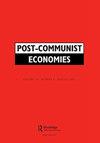Populism and economic policy: lessons from Central and Eastern Europe
IF 1.8
3区 经济学
Q2 ECONOMICS
引用次数: 2
Abstract
ABSTRACT A growing literature has identified a coherent economic model associated with populist governments in Central and Eastern Europe. This model runs counter to some aspects of the former neoliberal consensus in the region and to established theories of good governance. Considering three cases which are representative of these developments – Poland (since 2015), Hungary (since 2010), and Romania (2016–19) – we argue that a major unexplained puzzle is the relatively good economic performance of such governments. We develop three interrelated explanations for this apparent puzzle and test them using quantitative data. First, macroeconomic data show that the populist rhetoric of these parties is not associated with classical macroeconomic populism. Second, government accounting data show that public spending has been targeted towards specific groups and has not led to increasing tax burdens. Third, firm-level data on business confidence and institutional perceptions show no obvious negative effects associated with these governments.民粹主义与经济政策:中欧和东欧的教训
越来越多的文献已经确定了与中欧和东欧民粹主义政府相关的连贯经济模型。这种模式与该地区前新自由主义共识的某些方面背道而驰,也与既定的善治理论背道而驰。考虑到这些发展的三个代表性案例——波兰(自2015年以来)、匈牙利(自2010年以来)和罗马尼亚(2016-19年)——我们认为,一个无法解释的主要谜团是这些政府的相对良好的经济表现。我们对这个明显的难题提出了三个相互关联的解释,并使用定量数据对它们进行了测试。首先,宏观经济数据显示,这些政党的民粹主义言论与经典的宏观经济民粹主义无关。其次,政府会计数据显示,公共支出是针对特定群体的,并没有导致税负增加。第三,企业层面的商业信心和制度观念数据显示,这些政府没有明显的负面影响。
本文章由计算机程序翻译,如有差异,请以英文原文为准。
求助全文
约1分钟内获得全文
求助全文
来源期刊

Post-Communist Economies
ECONOMICS-
CiteScore
4.90
自引率
18.20%
发文量
21
期刊介绍:
Post-Communist Economies publishes key research and policy articles in the analysis of post-communist economies. The basic transformation in the past two decades through stabilisation, liberalisation and privatisation has been completed in virtually all of the former communist countries, but despite the dramatic changes that have taken place, the post-communist economies still form a clearly identifiable group, distinguished by the impact of the years of communist rule. Post-communist economies still present distinctive problems that make them a particular focus of research.
 求助内容:
求助内容: 应助结果提醒方式:
应助结果提醒方式:


